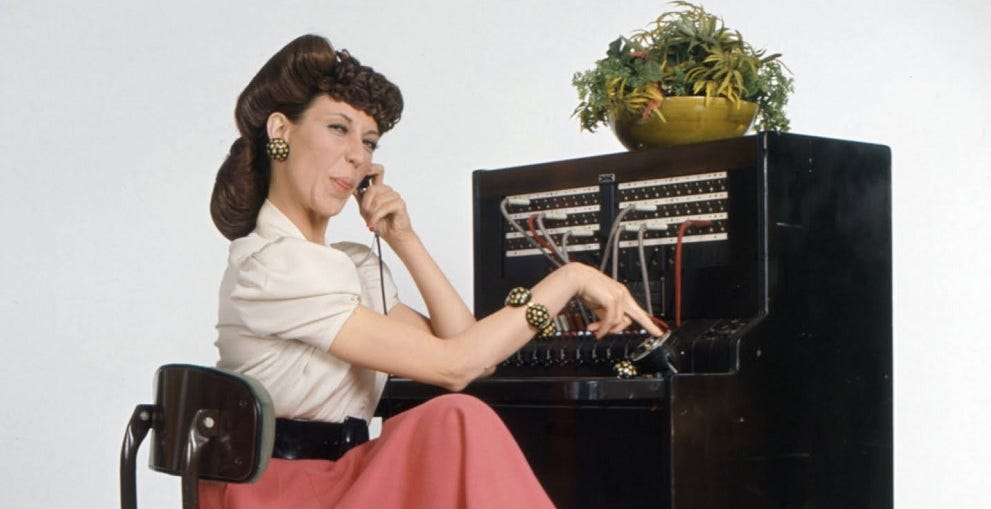Operator, Could You Help Me Place This Call?
Lessons Learned from 70's Popular Music and the Vanishing Analog World
One of my favorite flavors of musical comfort food is singer-songwriter folk-rock from the 70’s. I’m sure I’m not alone in that. It brings back memories of macramé and rock tumblers, making “God’s Eyes” out of yarn and popsicle sticks, babysitters with long straight hair wearing peasant blouses, corduroy pants and clogs, floppy hats and mellow vibes.
Many’s the morning I start the day cooking breakfast while listening to Carole King, James Taylor, CSNY, America, Bread, Gordon Lightfoot, and whatever rare nuggets Spotify serves up.
Lately though, I’ve been listening to Jim Croce’s “Operator (That’s Not the Way It Feels)” on repeat. I don’t know why, but I just can’t get enough of it. I’ll be scrambling eggs and singing along:
Operator, well could you help me place this call?
See, the number on the match book is old and faded
She's living in L.A. with my best old ex-friend Ray
A guy she said she knew well and sometimes hated
It’s not just the pleasure of singing along to an old familiar song, it’s not just a powerful nostalgia for my childhood, but a sense of loss for a time when you could drop a dime in a payphone and ask the operator to help you find a phone number and a person. I mean, Phone Operator songs is like a whole genre of popular music, take the Grateful Dead’s “Operator” for instance:
Operator, can you help me
Help me if you please
Give me the right area code
And the number that I need
My rider left upon the midnight flyer
Singing like a summer breeze
Or Chuck Berry’s “Memphis, Tennessee”
Long distance information, give me Memphis Tennessee
Help me find the party trying to get in touch with me
She could not leave her number, but I know who placed the call
'Cause my uncle took the message and he wrote it on the wall
Once upon a time there were phone books that listed most everybody’s phone number. Only really fancy people had unlisted numbers. But you could look up pretty much anybody’s phone number in the phone book. And if you couldn’t find their phone number, you could call the operator at the phone company to help you find it. People could be found, and other people could help you find them. Not only that, but you could have a conversation with the operator, if they were so inclined.
Lamenting the loss of switchboard operators, pay phones, phone books and place-based landlines is not just an exercise in nostalgia, it’s more than just a Buzzfeed listicle titled “If You Remember These 25 things Then You Are OLD!” It is the social cost of technological disruption in microcosm.
By now we’re all aware of the loneliness epidemic, we’re all aware of how fractured and factionalized our society has become, we’re all aware of the damage the information overload social media mobile device attention economy is wreaking on our minds and spirits. We’re all aware of it intellectually as much as we’re aware of it in our psyches and even bodies.
What we’re maybe less aware of, or more challenged to enact, is that the antidote to the toxin is simple human interaction. The beauty of the telephone operator was that their job was to help you find and connect to people. It wasn’t outsourced to a platform and an algorithm – it was a human job. Just because a computer can do something, doesn’t mean it should.
I have talked a lot over the years about the Human Economy and Baumol’s Cost Disease and the ravages of the cult of efficiency, productivity and infinite growth. When we are told that technology will make something more efficient, productive and easier, we are right to ask for whom? Who actually benefits?
If technological innovation increases efficiency and productivity, and we all share equitably in an increasing quality of life, more leisure time, social connection, security and stability, then I’m all in favor of it. But that’s not going to happen unless we collectively and collaboratively envision and design a different, human-centered future. And sometimes building the future means recapturing things from the past, things we may have lost because we didn’t know how much we needed them.
Operator, Can You Help me?
What does it mean to be in a world where we can ask others for help? Where we can show up for others and help them? How do we need to grow and what do we need to change in ourselves to show up more readily and fully for others?
We know that humans need to interact with other human beings, that not every interaction or experience needs to be “friction free”. In helping others, we help ourselves; we build our capacity for empathy, we affirm our interconnectedness and interdependence. Just like going to the gym, interacting with other human beings can be difficult and effortful, but it makes us healthier and happier in the long run.
Grateful to be traveling with you.
Thanks for reading.
Now go listen to some Jim Croce.





Hey Andy! This piece resonated in a big way. I keep seeing things like "new robotic invention eliminates the need for [insert menial human task here]." Whether it be flipping burgers, manning the fryer, or handling a task on an assembly line, my question is always, "but doesn't this take a paying job away from a human being?" Those fast-food jobs tend to be some of the first jobs young people go out to get, where they learn how to work with and interact with people outside of their family/friend circles, so turning those human jobs into automated machine tasks removes that valuable learning experience. As you said - sure, technology is making life better, but for whom? And at what cost?